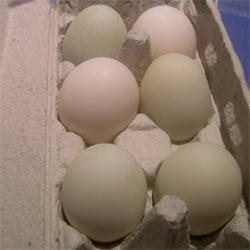Duck egg incubation by Mrs Boss: preparation
Posted by Fiona Nevile in Ducks | 53 comments It’s that time of year again. Mrs Boss is going broody. When I go down to collect the eggs from the nesting box, she is keeping them warm for me. She is at the early stages of broodiness so she can still easily be shifted off the nest and scuttles downstairs to eat and drink. She will join the rest of the flock to forage for seed but within twenty minutes or so she is snaking back up the ramp in the hen house that leads to the dormitory upstairs.
It’s that time of year again. Mrs Boss is going broody. When I go down to collect the eggs from the nesting box, she is keeping them warm for me. She is at the early stages of broodiness so she can still easily be shifted off the nest and scuttles downstairs to eat and drink. She will join the rest of the flock to forage for seed but within twenty minutes or so she is snaking back up the ramp in the hen house that leads to the dormitory upstairs.
In past summers she has spent weeks going in and out of jail. An anti broody coop is a really effective and inexpensive way of controlling broodiness in chickens. Generally two or three days in the clanger shifts them out of this state. Mrs Boss can take a week to get back to a non broody state. If you want eggs, broodiness is to be avoided.
This sad, diminutive hen came into her own when she fostered Farming Friends’ guinea fowl eggs last summer. We discovered that she was a wonderful mother and for the first time ever she looked happy and seemed to be content. She raised four strong guinea fowl and had a ball. In fact she even became an international movie star.
We are delighted to announce that Mrs Boss will be fostering Indian Runner ducks for The chicken Lady this summer. I collected the eggs this evening.
“When they hatch out you can almost see them growing.” Husband S was washing the eggs he had collected this afternoon. “How many do you think she can accommodate.”
When a hen goes broody she flattens her body on the nest for maximum incubation. These Indian Runner duck eggs are large. I tried to work out the answer. We need to go for the maximum as often some of the eggs are rejected by the hen after a few days.
“Why don’t we try four or five?”
“We always set an odd number of eggs under a broody hen. It seems to work well.”
In the end, he passed me the eggs, in an old egg box.
“There’s six there. See how you go.”
I have two or three days grace before introducing Mrs Boss to these eggs. It will be an early start for me. The broody apartment needs to be repaired and thoroughly spring cleaned. There is no point setting a hen on eggs if the environment isn’t clean and safe from predators.
At this stage no one can tell if the eggs are fertile. We can candle them in a couple of weeks to see if the embryos are developing. Each egg is a tiny miracle. If it is fertilised it will stay in a state of suspended animation until it is incubated. That’s how a hen can raise a brood that all develop at the same time. She will lay an egg a day until she decides that she has enough eggs. Then she will settle on her nest if you are lucky.
Once these eggs reach a temperature of 37? to 38 ?c. degrees, cells start to develop and the great Grand National egg development race begins. Different fowl have different incubation periods. Duck eggs take 28 days to mature, chicken egg gestation is a mere 21 days. Bantam hens take even less time, often hatching at 18 days. So mixing eggs from different fowl in the same nest is a no no. Once a hen sits, provide her with food and water that she can access from the nest. Once she is broody she will not leave her nest when she is peckish and can starve to death protecting her eggs.
I always visit the pen twice a day if I have a broody hen (with or without eggs) and gently lift her off her nest so she can relieve herself and feed. This provides a good opportunity to check the eggs and clean any fouled eggs in the nest. A clean damp cloth is handy here. Your hen is doing her best but sometimes needs a helping hand to keep her eggs clean.
Once the eggs hatch, the mother has to tend her chicks so any eggs that need a few more days are often rejected. Generally there is a two day window to accommodate first and last hatching.
As I write, the duck eggs are sitting beside me on the table and Mrs Boss is poised on the starting blocks, snug in the nesting box.
It’s a moment to be savoured. Bursting with hope and promise.
Leave a reply





Hi
We have 3 indian runners. One of the females is broody and has just started sitting on 12 eggs today. We’re real beginners, only got the ducks last summer and have no experience of hatching ducklings! Are we able to clean their shed out without scaring her off the nest? I’ve read on here about keeping the eggs clean so can we change the bedding under her or should we just wipe the eggs over? Also should we be keeping the other 2 away from her from now on or just before they hatch?
Thanks for your help!
Deb